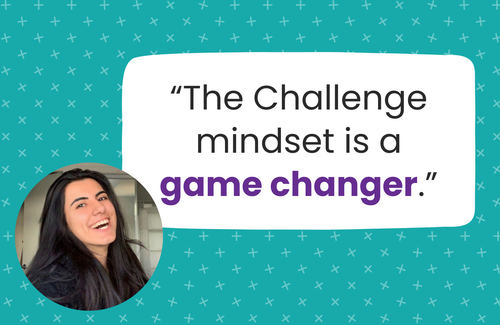When Harshita reached out to share how the Challenge Cards shaped her career journey, I was inspired by her story.
She used the Challenge mindset to create a career that energizes her - one that lets her solve meaningful problems in education every day.
I’m excited to share her words with you below.
-----
JP,
I came across one of your videos during university, & it helped me figure out how to move forward in my career. The 'challenge mindset' is a game changer. Thank you for this gem!
When I started university in Canada, I used my electives to explore a wide range of subjects - from sociology and statistics to biomedical engineering - before deciding to major in Philosophy, Politics, and Economics. I really enjoyed the variety.
At the time, I wasn’t sure what direction I wanted to take, so I spoke with a few senior PPE students about their paths. Law and public policy came up often, so I interned at both a law firm and a municipal government. I found myself especially drawn to education policy.
I started becoming curious about all aspects of education - teaching, curriculum design, edtech, policy work, and even career counseling. They felt like completely different career paths, each requiring its own degree or trajectory, and I wasn't sure how to make sense of that.
Around then, I came across your TEDx talk.
That’s when things started to click: I wasn’t confused - I had just identified the kinds of challenges I cared about, especially within education. Your Challenge mindset helped me realize that these different interests could actually exist under the same umbrella. That shift gave me so much clarity on how to move forward.
Today, I work at a public policy think tank where I coordinate education programs, and it’s been incredibly energizing. I now think about career progression with curiosity, rather than feeling pressure to stick to a single track.
One of the key challenges I’m involved in is making learning engaging - especially in topics like economics and public policy, which are incredibly relevant but often seen as dry or abstract.
In my role, I help facilitate activities that bring these concepts to life. For example, when we cover diminishing marginal utility, students take part in a chocolate-eating challenge. They get 40 seconds to eat as many chocolates as they can - and by the end, most can’t even look at another one. That physical reaction makes the concept real, not just theoretical.
Another challenge I’m actively working on is shifting the mindset that learning is just a means to an end - grades, college, a job. I want students to walk away feeling like learning can be empowering, not transactional.
One way I approach this is by bringing sessions like the “Economics of Taylor Swift” to life, which explore how her concerts affect local economies. It helps students connect the dots between pop culture and public policy—and realize that economics isn’t some distant idea. It’s happening all around them, all at once.
By making these concepts relatable and grounded in the real world, students gain a deeper understanding of how the world works. This empowers them to make informed decisions for themselves and those around them. Learning becomes more than just a step toward a grade - it’s a tool for navigating the world with confidence.



